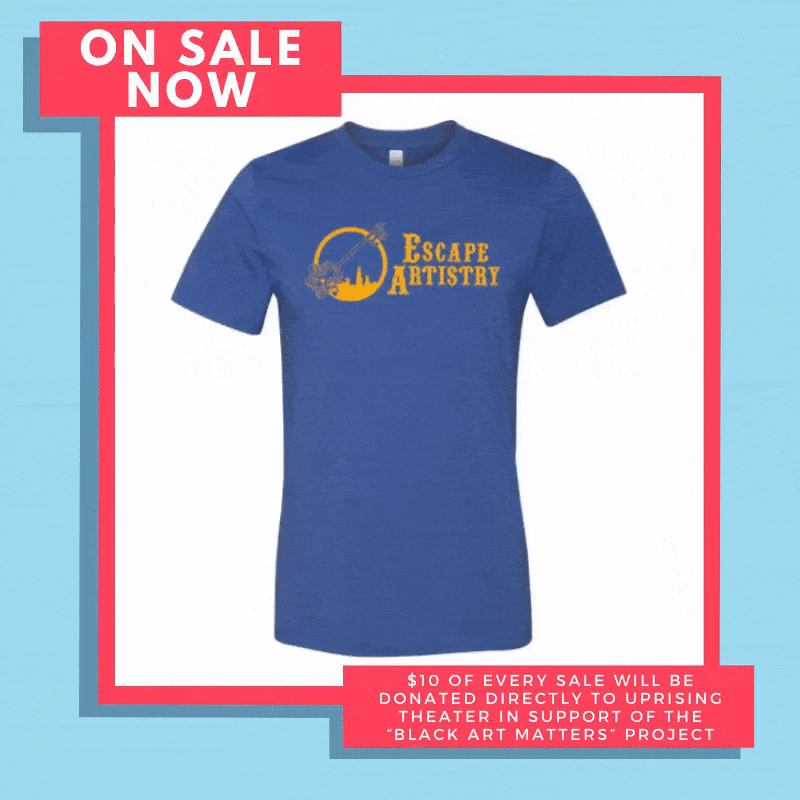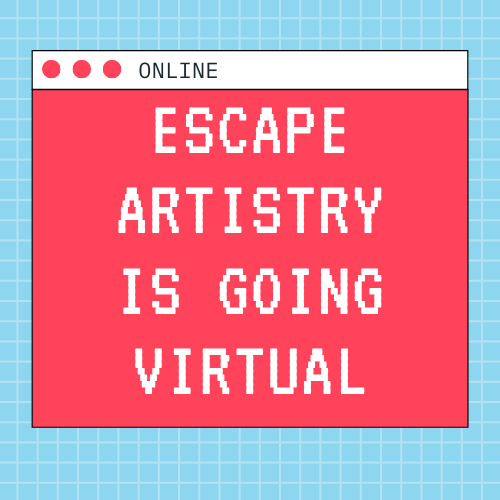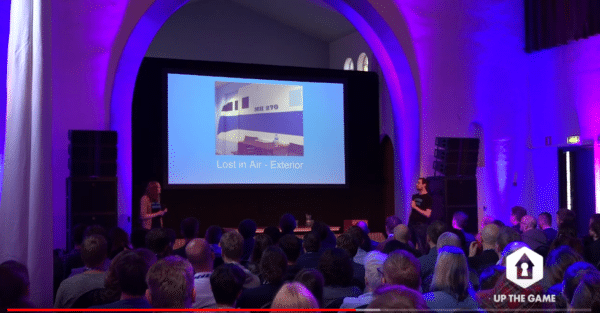Optimizing Your Marketing Budget for Social Good
Partnering with Non-Profits
As the Escape Room market in the United States grows, marketing and branding are becoming increasingly important. At Escape Artistry, we’ve gone from being the first room in the city of Chicago proper to being one of many companies with “Escape”-related names. If your business is anything like mine, you’re likely looking for ways to stand out from the pack to strengthen and differentiate your brand.
There are a number of statistics thrown around regarding how many times someone needs to see your brand and your name before they recognize it. Whether you believe it’s 14 (digital) or 7 (print), it's significantly more than once. Branding doesn’t pay the rent. But the idea that someone will say “I’ve heard of them” when they hear someone mention your company or more ideally when asked “Hey, have you done any escape rooms?” by a friend, they’ll reply “No I’ve never played -- I’ve heard of Escape Artistry, want to check it out?” because they know that my company offers the service they are looking for.
I’ve found a way to strengthen my brand, increase visibility, and provide help to my local community: partnering with and donating to local non-profit organizations.
Escape Artistry is built on a dedication to three E’s:
- Equity/Equality
- Education
- Environment
Our business practices, from hiring to physical materials, are informed by a commitment to these ideas. As our staff is mostly from the arts/non-profit world, the idea of our work helping to serve a larger social cause motivates and engages us. But that’s just us -- none of these things have to apply to you for non-profit partnerships to be a good idea.
Marketing is expensive, and the costs for advertising and labor can add up quickly. But partnering with non-profit organizations gives you the opportunity for free press, the development of a positive reputation, diversification of your social media posts, and -- hopefully -- an increase in traffic through your rooms.
Here are some ideas of how you can use your marketing dollars to do right by yourself and good in your community:
Make Donations
Offer donations of tickets to local non-profits
If the idea of your business partnering with a charity sounds overwhelming to you, or you’re looking for a low-impact (to you) way to get involved, donating tickets to non-profits is an easy step to take.
In fact, many non-profits will do the work for you. I’m sure you’re already receiving emails from various organizations asking for tickets to be donated for raffles and silent auction prizes (I’ve found that we get most of ours during the Spring and Fall months). Though you won’t be able to write the ticket donations off on your business’s taxes, it will likely still be free marketing for you. Significantly less than ¾ of the tickets we donate to organizations are redeemed. While people at the events you donate to will still bid on or purchase your ticket voucher, they aren’t really in it for the prize -- they’re at the event because they care about the cause. Everyone at the event will see the tickets to your escape room, and will begin to associate your business with the cause they care about. Some organizers are willing to include your escape room’s print materials, especially if they include discount codes, in all of their goodie bags.
We have found that a $132 value (4 tickets) is a significant enough donation that charities are excited about it and folks will bid on it, without it hurting our bottom line too much if they are redeemed.
Host Events
Donate a percentage of a session’s ticket price to charity
If you’d like to be more hands-on and closer associate your business with a local non-profit, host an event for them at your location. Run a promotion where for a limited time (one session, one day, one week) a percentage of every ticket sold becomes a donation to the non-profit. These are donations you can write off on your taxes, and the non-profit will often work just as hard as you to promote the event. For single-event fundraisers, we typically donate a higher percentage of our proceeds, as there is more of a limited opportunity for people to buy in. For many people, this is a no-brainer, kill-two-birds-with-one-stone situation -- they get to do something fun that also supports an organization they care about. If they had been interested in escape rooms before but felt like they couldn’t justify the ticket price or didn’t feel an urgency to go, this can be a good motivator.
Host a traditional fundraiser or networking event
If your space is suitable for holding non-escape game events (large open lobby, party room, etc.), you can hold a more traditional fundraising or networking event. As part of the event, the non-profit will certainly be willing to give you the chance to speak to their supporters about you, your business, and why they should come back and play one of your games. After, you can offer to sell gift certificates to any guest in attendance. If you have 50%, 75%, or 100% percent of the proceeds from those sales donated to the non-profit, it again provides a further incentive for the purchase -- and you can absolutely write those off.
Why would non-profits be excited to have you host an event for them?
Providing an activity and a facility is a huge help to non-profits. By eliminating the venue rental fee and the organizational work of having to sell tickets and plan activities, more of their time will be freed up to market the event. Think of it this way: for a traditional fundraising event a non-profit, using their often limited time and manpower, has to plan, organize, and run the event, and guests both have to pay a ticket price and then are asked to give money at the event. If they work with you, all they will need to do is show up and bring friends. Rather than simply asking their supporters for money, there is a tangible, enjoyable product they are asking people to buy. Based on my extensive experience working with non-profit theatres, I can tell you that donor fatigue is a huge obstacle in the non-profit world. (“I know I just asked you for a $50 donation last quarter, would you be willing to donate again?”) Many nonprofits are happy to have a ‘corporate’/business sponsor their work, particularly on grant applications. Having a local businesses champion them adds a level of legitimacy beyond that of individual one-time or even quarterly donors.
Establish Relationships
Partner for a day, a week, a month, a quarter, or a year with a non-profit you love
Choose a specific date, day of the week, week, month...etc. Every time someone buys tickets for that specific day you make a donation to a designated non-profit, with the understanding that the charity will encourage their supporters to play your games on these days. If you want to make sure that you’re only donating to the non-profit on behalf of guests who are specifically interested in them, you can give them a $.01 discount code. This won’t affect the cost in a meaningful way, and it will help keep track of whether or not people are aware of and actively supporting the partnership. If you are willing to make donations on behalf of guests who haven’t been directed to you for that specific reason, you can remove another barrier to guests and just decide that, say, Mondays are for Mothers. Every Monday (in a year, quarter, month) proceeds or a portion of proceeds go to a local mothers shelter. The longer you run this deal, they longer word has to get around.
Partner year-round
Make a non-profit you love an affiliated sales partner! Create an infinite-use code for them in your system and share it with the non-profit. Pledge that you will make a donation to their organization every time someone uses that code. This is a great way for non-profit boards to fundraise, and it again helps prevent donor fatigue. Since it is a longer-term partnership it is naturally more reciprocal. You will invite your network to learn about the non-profit, and they will invite their network to learn about your business.
By partnering with causes you care about, you will attract like-minded guests. Customers who share your values are more likely to enjoy your product and recommend you to their friends. While a mission statement is more important for non-profit than for-profit businesses, I have found that when asked why they chose Escape Artistry over one of the many other escape rooms located in the Chicago area, a large percentage of guests have told me that our commitment to local non-profit work and our social consciousness helped tip the balance.
Be Choosy
Use the “Goldilocks Principle” when selecting a partner
Rather than just selecting the non-profit that seems the easiest or most exciting, take some time to think about their organization relative to yours. If the non-profit is tiny they will not have a lot to offer in the way of a mailing list or referrals. If the non-profit is too big they probably will not be willing to share their mailing list or put as much energy towards a small event. They will send you a nice thank you letter for your donation and probably add you to their mailing list. They might call you a few times a year to ask if you are able to donate again.
Instead, find a non-profit where you can have a real relationship with the people and cause. It helps if it’s a mission you feel personally connected to. Do you know someone on the board? Is it a cause that you have experience with? Have you donated to them in the past? Is their size and business model relevant to yours?
Once you have found the non-profit that is right for you and your business, make sure you are clear when you communicate with them. Don’t promise them a large payback that you can’t deliver on, and make sure they understand your expectation of how much work they will do to promote and put on this event. Like any good partnership, hopes and expectations should be clearly communicated before the work begins.
In the beginning, it’s best to do a little experimentation. I don’t suggest that your first step be to start a year-long partnership. Try a small collaboration to see how it works, and make sure you communicate clearly with your partner. Was it satisfying for both parties? What worked and what could be done better next time? If you both enjoy working with one another continue to grow and support one another.
If you aren’t sure which organizations are in your area, Charity Navigator is a great starting off point.
Think About the Perks!
If supporting a cause you care about isn’t rewarding enough on its own, or if you are excited about it but you need to get the rest of your team on board here are some additional perks...
Added value for staff
- At Escape Artistry we allowed staff to choose non-profits as a means of showing staff appreciation. We ran this once a week as part of a “Charity Tuesday” initiative.
- Feeling like their company stands for something will help staff members feel loyal to and proud of the company and its mission.
Great Material for Mailing List and Social Media
- Working with a non-profit is a great opportunity to reach out to your mailing list in a meaningful way. Let them know (humbly) that you’re partnering with the organization, and give them the opportunity to donate. They may not come, but it allows you to remind them that they like your company and that you are doing meaningful work.
- In marketing your partnership you have the opportunity to diversify the content on your social media platforms. You will be able to cross-post with organizations, and donating is an easy action item for your network.
- As an escape room, it is easy to run out of new content to share once you are through the initial push of advertising your opening. Rather than simply finding new ways to promote existing rooms, new partnerships and initiatives give you something new to promote and discuss.
Increased attention from consumers
- As a consumer, I’m often excited to share on social media and make a purchase if I feel good about the purchase I’m making. That my purchase is making an even greater positive impact on the world than simply contributing to the economy.
If you have never partnered with a non-profit organization, I hope these tips gave you a reason to start! And if you have done fundraising or charity initiatives in the past, I hope this will help you diversify your engagement and offerings. I firmly believe that we have a responsibility to each other and to our communities, and that as a for-profit business, these partnerships can exist as a fantastic opportunity rather than a drag on resources and manpower.



